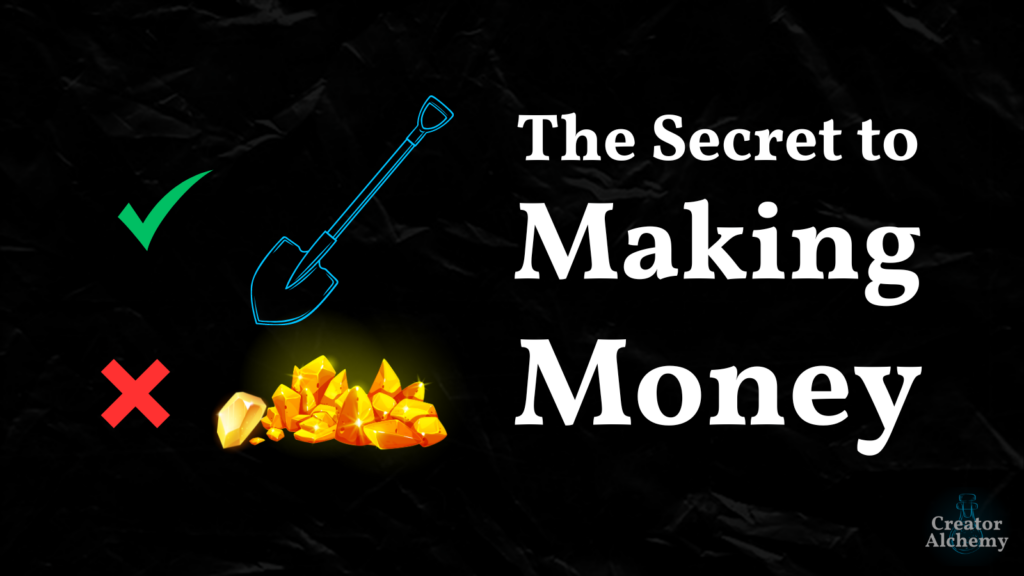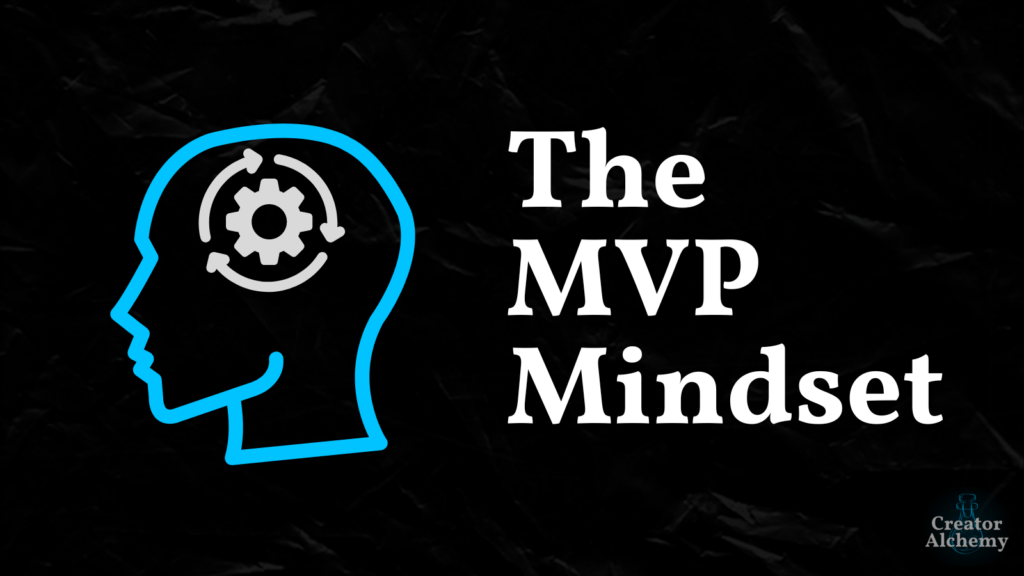Most of us have a good handle on most aspects of our businesses.
But we can’t be on top of everything, all the time—and the one thing we don’t stay on top of typically becomes the one thing that keeps us from success.
There are just too many things to stay on top of—to remember to do, regardless of how much delegation, outsourcing, and systems-building we do.
So it’s easy to slip into bad habits that trap us in mediocrity without even realizing it.
Anytime I hit a plateau and can feel I’m slipping into a cycle of mediocrity—of spinning my wheels and getting nowhere no matter how hard I try—I look up at a post-it note I keep on my desk.
It’s got a handful of reminders of critical lessons I’ve learned over the years that I’m mostly likely to forget—especially when the stresses of entrepreneurship start to build up.
Whatever I’m struggling with—a plateau, frustration, confusion, or lack of results—typically traces back to forgetting one of these lessons, which is why I’m engaging in a bad habit trapping me in mediocrity.
You might struggle with the same ones—most entrepreneurs do—so here are six habits that trap entrepreneurs in mediocrity and what to do about them…
•••
1. Overcomplicating Everything
I get it—you’re a deep thinker. You’re super smart. Maybe you’ve got ADHD (self-diagnosed or formally diagnosed). Maybe you identify as neurodivergent. Or maybe you’ve found countless other ways to justify the fact that you just overcomplicate the shit out of everything.
You’ve heard that simplicity scales, while complexity causes catastrophe.
Yet…you continue to complicate the shit out of everything:
- Fancy email automations.
- Tons of complicated funnels.
- Trying to repurpose every post to every social media platform.
- A bloated tech stack you can’t fully keep track of.
- Too many products to pitch.
- And so much more.
I recently ran into this issue—I decided to revamp my value prop and change my lead magnet for my newsletter.
Changing a few words describing what I do and swapping out one lead magnet for another sounds simple, right?
Nope.
I had overcomplicated the shit out of everything. My automations were a mess. So when I pulled on a single thread, everything unraveled. A week later, I finally tied everything back up. But as I went through everything, I realized just how complicated I’d unknowingly made it on myself.
Now, it’s much simpler (and will be easier to update in the future).
It’s easy to overcomplicate things—it’s our natural state to overthink. Our brains are designed to see all the problems and possibilities in front of us.
But it’s our responsibility to reign those natural impulses in by deliberately practicing ways to simplify our processes to avoid getting (and staying) constantly overwhelmed.
Otherwise, you’ll stay trapped in mediocrity.
A simple reflection prompt: “How am I overcomplicating this?”
•••
2. Thinking Too Small
One of my grad school supervisors had horrible posture.
He was a 6’5” 300 lbs powerlifter who did therapy with kids.
“I slouch so I don’t look as big to them. I can be intimidating,” he’d always say.
So he spent 30+ years of his career shrinking himself—his physical stature and his personality.
Many of us literally and figuratively shrink who we are to placate other people.
We think too small. We act too small. We exist too small.
Now, self-acceptance is its own skillset that’s beyond the scope of this piece (let me know if you want a deep dive on it, though).
But there are a few questions that have helped me break out of staying too small, and ones I regularly go back to anytime I feel myself starting to shrink:
- What would the $10M version of my business look like (or $100M, $1B, etc.)?
- What would I do if I knew I couldn’t fail?
- If I had unlimited resources, what’s the one thing I’d dedicate the next 10 years of my life to?
- If I fully accepted myself and what I truly want to do with my life, what single sentence could I write, right now, that would encapsulate my truth about who I am and what I want?
But this goes beyond impact and income—it’s also about letting yourself fully be yourself.
The more I accept myself and give myself permission to think bigger, act bigger, and exist bigger, the more successful I become (and the more authentic I feel).
Don’t be afraid to be yourself, give yourself permission to think about your true potential, and dare to be great.
Otherwise, you’ll stay trapped in mediocrity.
A simple reflection prompt: “How am I thinking too small?”
•••
3. Expecting It to Be Easy
Entrepreneurship is fucking hard.
Anyone who tells you different:
- Has a product/service they’re trying to sell you
- Has never actually built anything and has no idea wtf they’re talking about
- Has an inheritance, nest egg, or wealthy spouse they’re not telling you about
Doesn’t matter if you have a business degree or not.
Doesn’t matter if you have a large following or not.
Doesn’t matter if you have a great product/service or not.
Entrepreneurship is fucking hard.
Most people go into something with the naïve expectation it’ll be easy—that they know some secret that’ll catapult them to success—then when reality doesn’t meet their unrealistic expectations, they quit.
When I started my business, I thought I’d instantly succeed. A psychologist entering the personal development space—sharing evidence-based psychological strategies and offering executive coaching services? Who wouldn’t want that?
Growing my audience and my business would be easy.
Spoiler Alert: It wasn’t.
Early on, I legitimately debated how large of a business mailbox I should get. “The small one might not be able to fit all my fan mail and swag gifts from companies,” I thought.
I’ve never gotten “fan mail” to my physical mailbox. Plenty of email, sure. But nothing compared to my grandiose idea of becoming an instant-celebrity and successful entrepreneur.
I quickly learned no one gave a shit about me, my credentials, or what I wanted to share.
It was my job to build a reputation from scratch, since I was new to creating content and running a business—and didn’t know anyone in the online/entrepreneur space.
I had to learn how to build a business—copywriting, offer creation, marketing, networking, value ladders, content ecosystems, and so much more.
It’s never been easy. And every time I’ve expected it to be easy, I’ve gone into a project unprepared for the time, energy, and effort required to succeed.
But I look at entrepreneurship like a do martial arts, or any worthwhile endeavor—the fact that it’s hard is one of the things that makes it beautiful and worth doing.
So don’t expect worthwhile endeavors to be easy. Expect them to be hard and optimize your decisions and workflows accordingly.
Otherwise, you’ll stay trapped in mediocrity.
A simple reflection prompt: How realistic are my expectations of the time, energy, and effort required to make this succeed?
•••
4. Staying the the Lab
The lab is safe—you spend all day thinking, planning, and theorycrafting all the things you might-maybe-could-do-one-day-to-at-some-point.
Side Note: I go deeper into the concept of theorycrafting and how it holds us back in this article: Tired of Living at the Intersection of FOMO and Shiny Object Syndrome? Here’s Why Theorycrafting is Holding You Back…
The issue, is when we stay in the lab and never enter the arena—we never put ourselves and our ideas out into the world to test their mettle, get feedback, and improve based on that feedback.
Here’s an example—I love creating landing pages. It’s a weird interest, but copywriting and offer creation are just…fun for me. So it’s easy for me to get caught up planning out future verticals for my business and spend weeks pre-optimizing and building something without ever checking to see if people actually want it and are willing to pay for it.
I did this way too much early in my business. I spent tons of time, energy, and money building offers no one wanted.
Now? I create surveys to gauge interest, spin up a landing page, pre-sell, build an MVP, then iterate from there.
What I don’t do anymore is spend days or weeks brainstorming all the things and creating elaborate plans and landing pages.
Planning quickly becomes justified procrastination in disguise.
You’ll learn more by doing than thinking about doing.
Otherwise, you’ll stay trapped in mediocrity.
A simple reflection prompt: How can I spend more time living in the arena instead of theorycrafting in the lab?
•••
5. Overlooking the Obvious
One of the most cliché pieces of advice everyone’s heard but virtually no one applies: Don’t miss the forest for the trees.
But the opposite is equally true: Don’t miss the trees for the forest.
Here’s what I mean…
Most of us get so caught up in looking ahead to our 5-year vision or how awesome our business could be in the future that we completely overlook what’s right in front of us today.
We rarely take the time to stop and consider questions like:
- What’s too obvious to see right now?
- What solutions are too obvious to see?
- What problems are too obvious to see?
- What paths forward are too obvious to see?
For example, I hate launches and the unpredictability of revenue from one-off purchases. When I ran multiple cohorts of a live coaching program, people consistently wanted it to last longer. With my self-paced programs, people consistently give great feedback and ask, “When is there going to be a live element to this? I’d love to meet other people who’ve taken the program.” Plus, my personal time doesn’t scale, so I limit how much 1:1 coaching I do, but I want to help entrepreneurs on a larger scale.
I’ve been struggling with all these dilemmas for months.
So what’s the obvious solution that addresses all these issues?
It was too obvious for me to see until I came across a video where Nathan Barry coaches Tiago Forte on how to scale his company to $10M a year.
One thing Nathan said that stuck with me was that with a one-off or launch model, when January 1st rolls around, you start back at $0 in revenue. But if you have a recurring revenue model—like a subscription—every January you start with money coming in. And as long as you nail your offer, people keep joining and sticking around, which compounds your recurring revenue over time. This makes it easier to reinvest in your business to make it even better for customers, make growth projections, and set your budget.
With a launch model, you’re putting all your eggs in one basket. If the launch doesn’t go well, you’re screwed. If the launch does go well, you’re still looking at flatlined revenue until the next launch—which you better nail—over and over constantly starting back at zero.
I realized creating my own membership community would be a win-win: Entrepreneurs who join get exactly what they’ve been asking for—tons of peer support, resources, and coaching from me—and I get to help people transform their lives and businesses and get recurring revenue to reinvest into making the membership even more valuable to members.
But I had been so focused on thinking about the next thing to build, I was overlooking the right thing to build.
So I built Your Fellow Coaches.
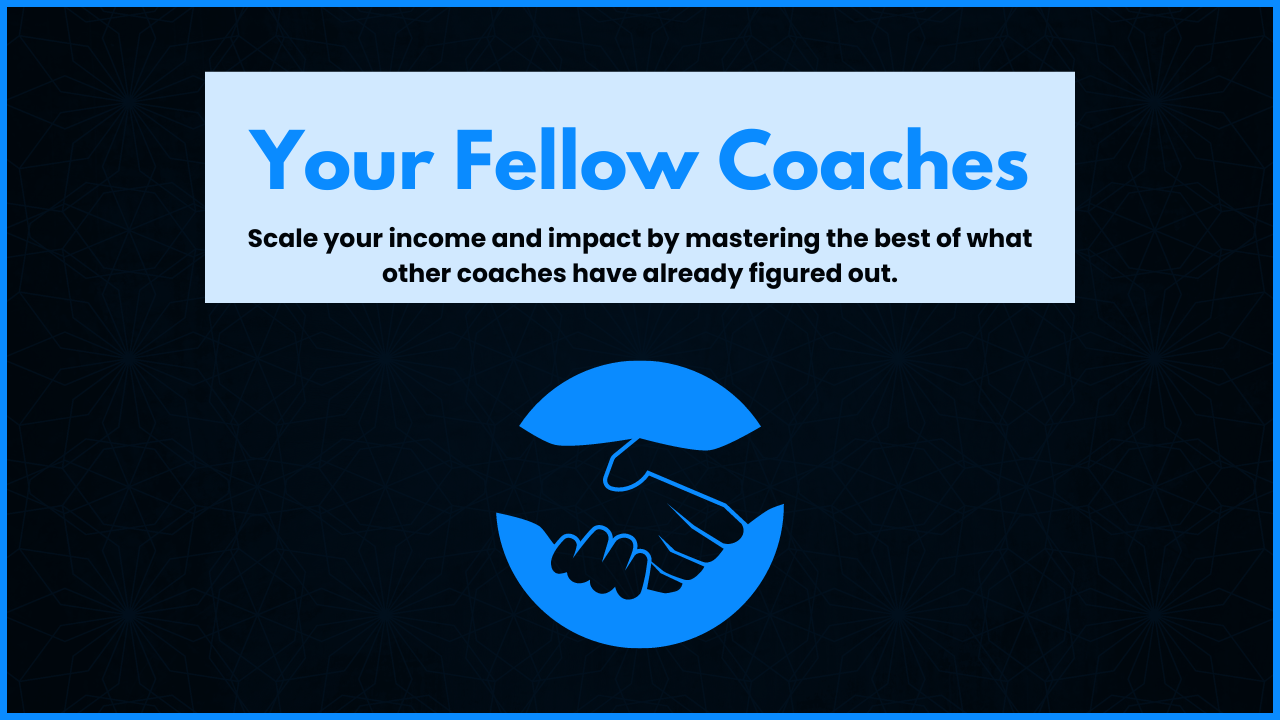
It’s a free website and paid membership community for life and executive coaches who want to scale their income and impact together.
It’s called Your Fellow Coaches, and it’s what I wish I would’ve had when I started my own coaching journey.
The philosophy is simple:
If I share what I know with you, and you share what you know with me, then we both walk away knowing twice as much. Multiply this by 50, 100, 1000 coaches and imagine the possibilities.
Within a couple of weeks of launch, we’ve already had dozens of incredible coaches join the community and share their experiences and form friendships from all over the world.
It’s so easy to overlook what’s been right in front of us—too close and too obvious to see—this whole time.
Which is why we have to take time to consider how we’re missing the trees for the forest.
Otherwise, you’ll stay trapped in mediocrity.
A simple reflection prompt: In what ways am I overlooking the obvious right now?
•••
6. Worrying About Your Percentage
Wayne Gretzky is considered one of the greatest hockey players in history.
He attempted 5,088 shots in his career.
82.4% failed.
You’d think some of the most popular music artists—with tons of hits—must just be great at coming up with bangers. But, as Noah Kagan points out here, their percentage of coming up with hits is actually low:
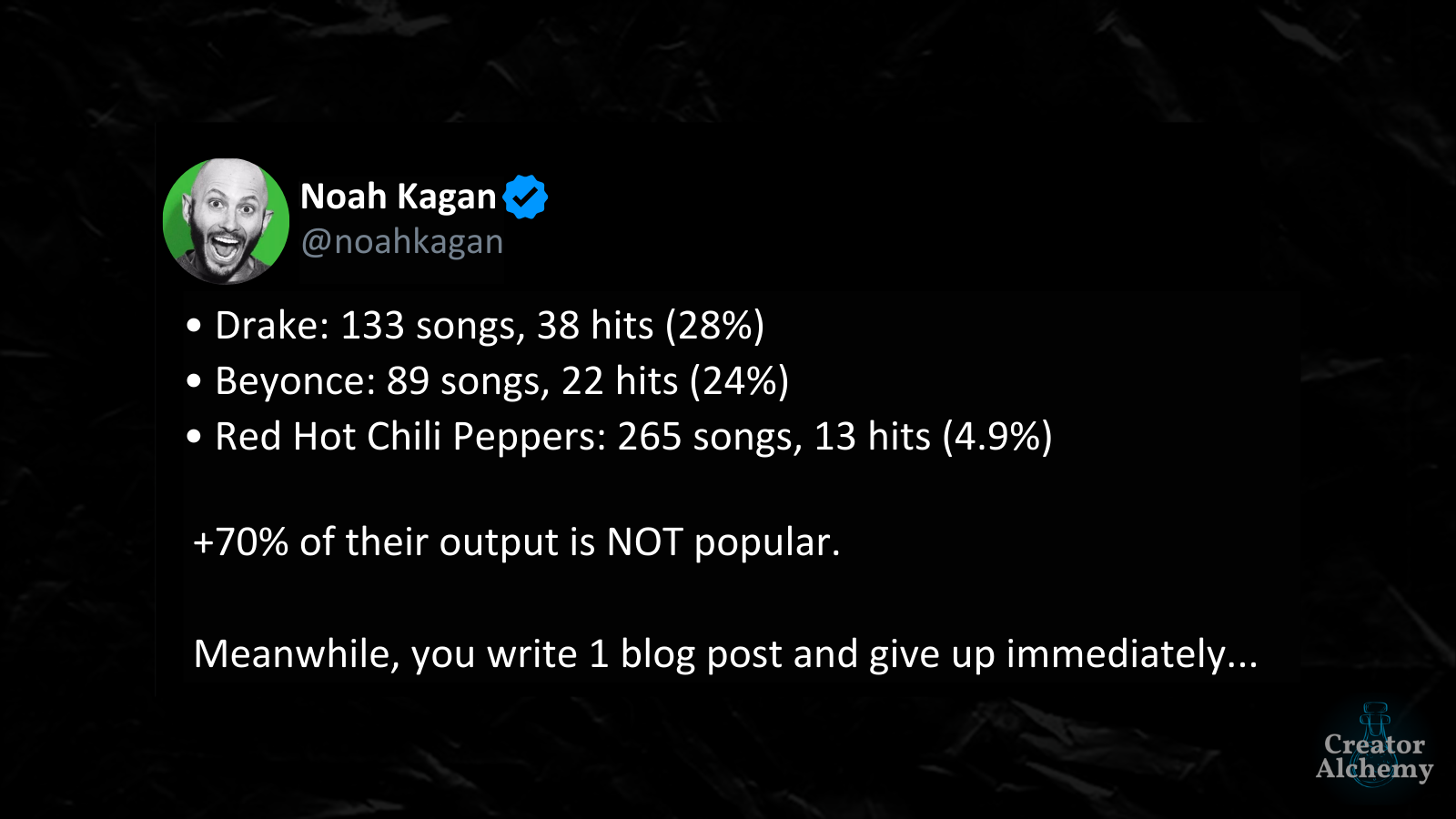
Too many entrepreneurs are so afraid of failure, they avoid attempting something that might fail.
But think of every entrepreneur you respect—they’ve “failed” more times than most people have even tried. Their constant attempts, despite failure, is what makes them endearing and inspirational. Because when they do win, we know it wasn’t a fluke.
Success is predicated on the shots you take. Because you can’t make the shot you never take. If you take a shot, you have a chance of succeeding. If you never take the shot, you guarantee failure.
Repeat after me: The name of the game is shots on goal.
VC is a shots on goal game—invest in 100 companies hoping just one succeeds, because that one success makes up for the 99 failures.
Content creation is a shots on goal game—for every 100 articles or videos you put out, 2-3 might hit.
Entrepreneurship overall is a shots on goal game—most of the things you try (campaigns, features, offers, etc.) will fail. But if you keep going, keeping shooting your shot, eventually some of those things will land and—pardon the belabored sports analogy—you’ll see hockey stick growth.
But when you’re facing down a series of consecutive misses—failures—it’s easy to forget the name of the game is shots on goal.
Recently, after publishing weekly articles for months and months, it seems like nothing I published was hitting—resonating—with my readers. I started to get disheartened—Does my content suck? Am I not creating something valuable? Are people just not interested anymore?
But I kept publishing. Then, I published How to Make Success Inevitable (7 Skills Anyone Can Learn), and within 48 hours it became my 2nd most-read article.
When it comes to shooting your shot—yes you should aim, yes you should maximize your chances of succeeding, but you can’t be too precious and too afraid to miss the shot that you never take the shot.
Every shot you take is an opportunity to succeed.
The sooner you can embrace this “shots on goal” mentality, the sooner you can get start to conquer your self-doubt and start increasing your likelihood of success.
Otherwise, you’ll stay trapped in mediocrity.
A simple reflection prompt: How can I take more shots on goal this week?
•••
Final Thoughts
When I coach entrepreneurs, the number one obstacle standing in their way from achieving what they want is…themselves:
- Overcomplicating things.
- Thinking too small.
- Expecting it to be easy.
- Staying in the lab.
- Overlooking the obvious.
- Worrying about the percentage.
Each of these habits traps entrepreneurs in mediocrity. But the solution to overcoming these habits is simple—do the opposite.
- Simplify things.
- Think bigger.
- Expect it to be hard.
- Live in the arena.
- Identify the obvious.
- Ignore your percentage.
These six reminders never fail to help me realize how I’m getting trapped in a cycle of mediocrity and what I need to do to escape it.
I hope they’ll help you, too.
Here’s the post-it note I keep on my desk:
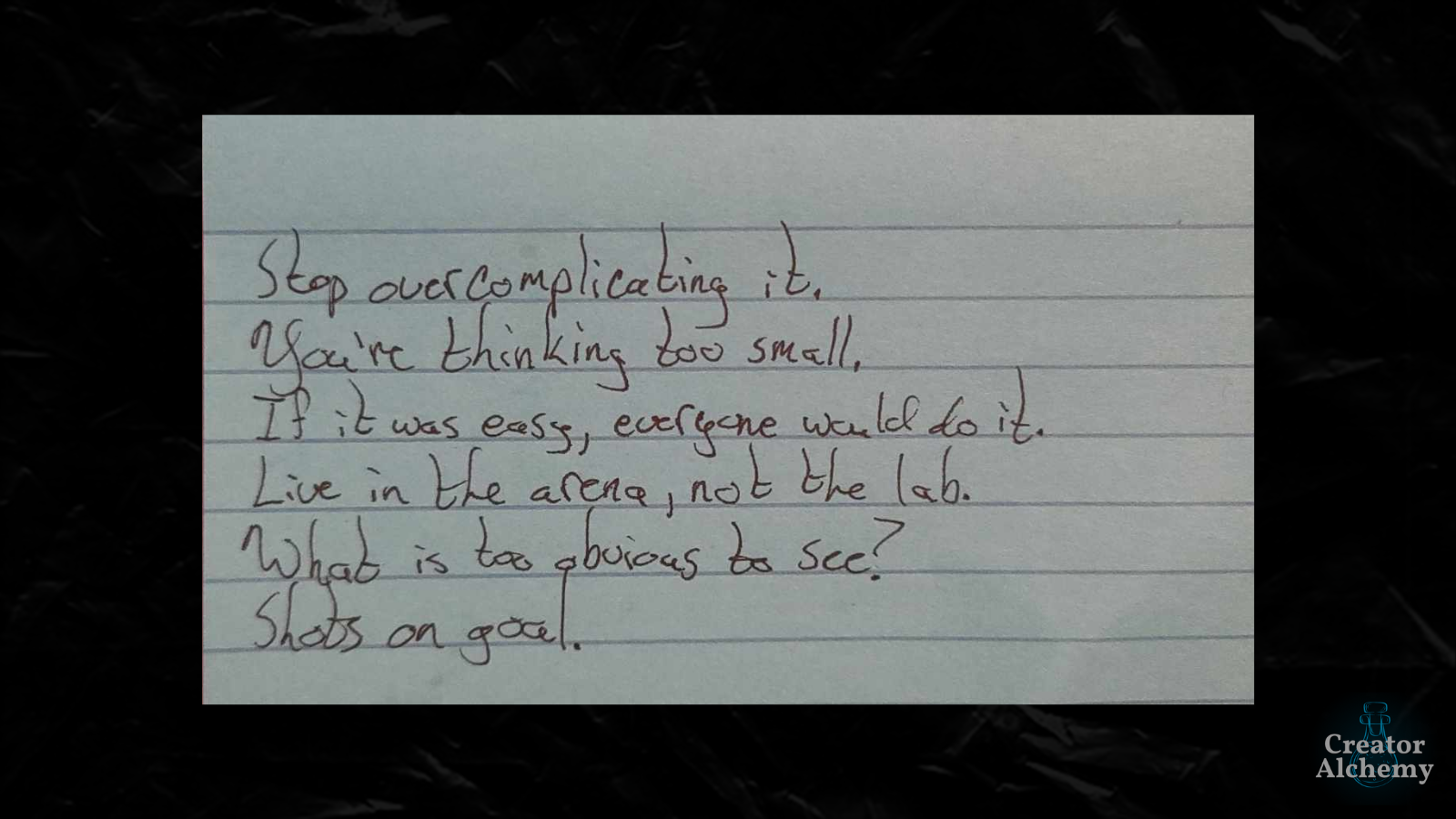
•••
P.S.
If you’re interested in learning other strategies on building better habits, check out this article: Habits Made Simple: How to Break Bad Habits and Make Good Ones (Explained By An Actual Psychologist).

